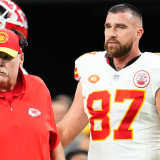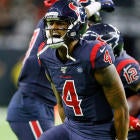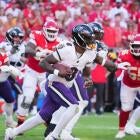Bills at Texans: Odds, point spread, game pick, TV channel, preview and more for AFC wild-card matchup
Everything you need to know about Houston's home playoff game against Buffalo
The opening game of wild card weekend sees the Buffalo Bills travel to Houston to take on the Texans. The AFC South champions should hopefully be welcoming back two major contributors in J.J. Watt and Will Fuller, while the No. 5 seeded Bills bring their stingy defense down to NRG Stadium in hopes of slowing down an explosive Texans attack.
The winner of this contest won't know who they're playing in the divisional round until the conclusion of the nightcap, but each team is capable of putting a scare into either the Ravens or Chiefs, albeit for different reasons. Let's not get ahead of ourselves, though. We still have to decide a winner in Round 1.
Before we break things down, let's recap how you can follow all the action this weekend.
How to watch
Date: Saturday, Jan. 4, 2020 | Time: 4:35 p.m
Location: NRG Stadium (Houston, Texas)
TV: ESPN | Follow: CBS Sports App
Odds: Texans -2.5, O/U 43.5 (heading into Friday), per Sportsline
Get into the playoff action by playing CBS Sports Playoff Pick'em. Pick the games for your free chance to win $5,000 or start a fully customizable pool with friends. Terms Apply.
When the Bills have the ball
The Bills are a defense-first team, but that doesn't mean their offense isn't at all dangerous. It's a below-average unit (24th in yards per play, 25th in points per drive. 22nd in DVOA), sure, but they do have playmakers. In Josh Allen, they have an athletic quarterback who can make any throw on the field and create plays out of nothing with his legs. In Devin Singletary, they have a versatile back who can do damage on the ground and through the air. In John Brown and Cole Beasley, they have a speed threat and a possession receiver who can each get open against just about anybody.
The key to the Buffalo offense is not being put in situations where they need to create explosive plays and high-scoring games. The Bills scored 30 or more points only twice this season -- in each of their games against the Miami Dolphins. They reached 20 points only five more times, which means they scored less than 20 in nine of their 16 games -- including each of their last four, as they limped their way into the playoffs with a 1-3 finish to the season.
So who wins Bills vs. Texans? And which side of the spread can you bank on in well over 50 percent of simulations? Visit SportsLine now to find out which side of the spread you should be all over on Saturday, all from the model that has returned over $7,000 on its top-rated picks.
If they can grind things down and win a low-scoring game, that's where the Bills want to live. That means a heavy dose of Singletary and Frank Gore. It means Allen throwing to his first read more often than not, and if that player isn't open, tucking it and trying to gain a few yards to keep the clock moving and prevent the offense from being stuck in second- or third-and-long situations, where the Bills were among the worst offenses in the league. (Per Football Outsiders, Buffalo ranked 30th in DVOA on second-and-long and 22nd on third-and-long.)
Following an early-season disaster against the Patriots, Sean McDermott and Brian Daboll placed an extreme priority on Allen's not turning the ball over; and to his credit, after throwing six interceptions and losing two fumbles in Buffalo's first five games of the season, Allen threw just three picks and lost only two fumbles during the team's final 11 games. As a result, the Bills had the NFL's 10th-lowest percentage of their drives end in a turnover, helping keep afloat an attack that doesn't do all that much at an above-average level.
The Houston defense Buffalo will be tasked with beating this weekend was one of the NFL's worst during the regular season. Despite its opponents having the third-worst starting field position in the league despite their being a top-10 turnover-creating unit, the Texans still managed to rank only 24th in points allowed per drive and 21st in the percentage of opponent drives that ended in a score. That's because they ranked 31st in yards per play and 31st in yards per drive. They were dreadful on third downs (31st in opponent's conversion rate on third downs and 32nd in DVOA), meaning they couldn't get off the field and repeatedly allowed opponents to sustain long drives. They did not fare well against either the run (22nd in DVOA) or the pass (26th), and they did not get a push in the run game (22nd in Football Outsiders' Adjusted Line Yards) or in the pass rush (25th in pressure rate). Worse yet, they were the worst red zone defense in the NFL, allowing opponents to convert 71.4 percent of red zone chances into touchdowns.
The Texans defense we see on the field Saturday is going to look somewhat different than the one that has been on the field for the past several weeks, for one big reason: J.J. Watt is coming back. Watt has been out since Week 8, recovering from surgery to repair a torn left pectoral muscle. Though he is not the utterly unstoppable force he once was, Watt is still the defense's best player, and one who needs to be accounted for on an every-snap basis. The middle of the Buffalo offensive line will have its hands full with Watt on the inside. Center Mitch Morse and guards Jon Feliciano and Quinton Spain form a solid group up the middle, but Watt is capable of wrecking any linemen when he's on his game.
Watt, Whitney Mercilus, D.J. Reader, and the rest of the defensive front will be tasked with getting enough pressure on Allen to force him into mistakes (Allen had a 60.5 passer rating under pressure this season, per Pro Football Focus, compared to a 95.2 mark when throwing from a clean pocket), and with slowing down Singletary and Gore enough to force the Bills to put the game in Allen's hands. The Texans showed a particular weakness against runs right up the middle this season, allowing 4.63 yards per carry on those plays, per Football Outsiders. That's where Buffalo had its most success in the run game, with Singletary and Gore able to slice through the middle of defenses concerned at times with not allowing Allen to use his athleticism to get outside.
The way most teams tried to beat the Texans this season was throwing early and often at their eminently burnable cornerbacks. Bradley Roby and Jonathan Joseph had solid seasons, but defenses found it extraordinarily easy to attack second-round pick Lonnie Johnson (128.9 passer rating allowed, per PFF), trade acquisition Gareon Conley (104.2, though he was better in Houston than Oakland), and waiver-wire signee Vernon Hargreaves III (131.5 in six games). Given the alignment trends for each team, we'll likely see a lot of Hargreaves and Beasley working against each other in the slot, while Conley and Joseph get the primary assignments against Brown, Isaiah McKenzie, and Duke Williams on the outside. The slot matchup -- in particular -- is one to watch because if Beasley can win quickly off the line, it will allow Allen high-percentage throws that have a small chance of being turned into takeaways, allowing the Bills to march their way down the field while burning clock at the same time.
The Texans will also have to be wary of allowing Allen to escape the pocket and make plays on the run. Houston allowed 240 yards on quarterback scrambles this season, according to Sports Info Solutions, third-most in the NFL. Allen scrambled 46 times for 330 yards, 19 first downs, and three touchdowns, making him one of the most dangerous scramblers in the league.
When the Texans have the ball
The marquee matchup on this side of the ball is unquestionably DeAndre Hopkins vs. Tre'Davious White, but we'll get to that in a minute because unless Will Fuller is healthy enough to suit up, it might not matter. Here's what we wrote after the Texans' Week 15 victory over the Titans:
"This was the 21st game of Deshaun Watson's career that he played with Will Fuller in the lineup. In those 21 games, Watson is 447 of 668 (66.9 percent) for 5,898 yards (8.83 per attempt), 50 touchdowns, 19 interceptions, and a 107.7 passer rating. In the 16 games he's played without Fuller, Watson is 338 of 504 (67.1 percent) for 3,634 yards (7.21 per attempt), 21 touchdowns, nine interceptions, and a 94.5 passer rating. It's safe to say the speedy receiver helps his quarterback a whole lot."
Fuller suited up against the Buccaneers in Week 16, but he exited with yet another injury after just 19 snaps, and Watson proceeded to have one of his worst games of the season, going just 19 of 32 for 184 yards and an interception against a Bucs pass defense that was lit on fire by several different opponents throughout the season. The way Fuller draws attention away from Hopkins with his ability to burn defenses deep down the field at any moment is key to unlocking the Watson-to-Hopkins connection.
That's particularly true against a defense like the Bills, whose No. 1 priority is taking away throws deep down the field. The Bills allowed only 15 completions on throws that traveled at least 20 yards in the air during the regular season, per Sports Info Solutions, the third-fewest in the NFL. Meanwhile, they had five interceptions, two dropped interceptions, and eight pass break-ups on those types of throws, against zero touchdowns. That means the defender was just as likely to get his hands on a deep ball thrown against Buffalo as was a receiver, which is pretty incredible.
Sean McDermott's unit plays a lot of zone coverages that encourage short, quick throws, which he counts on the linebackers, safeties, and even corners to come up and make tackles against. That style of defense was wildly successful for them. The Bills allowed only 4.8 yards per play this season, the fourth-lowest average in the league, while they ranked second in both points allowed per drive and percentage of opponent drives that resulted in scores. They allowed a considerably below-average passer rating of 78.8, a better mark than every team save for the Patriots and Ravens. That was helped along by the fact that the average pass thrown against Buffalo's defense traveled only 7.1 yards in the air, the second-lowest average depth of throw in the NFL.
That might seem like it works to Watson and Hopkins' advantage because the Texans made a concerted effort to lower the degree of difficulty on their connections this year, but A. they did that largely to alleviate the pressure on Watson to scramble around and make something happen behind a still-dreadful offensive line; and B. the Bills will gladly let Hopkins catch four- or five-yard passes at the expense of him getting open downfield. If the Texans think they can dink and dunk their way to scores, converting third downs and in the red zone against one of the NFL's best third down (35.8 percent conversion rate, seventh in the league) and red zone (55.8 percent, 14th) defenses, the Bills will let them try.
Buffalo will also heartily encourage the Texans to run the ball, keeping defenders out of the box and presenting the Texans with what looks like a numbers advantage. The Bills dropped an eighth man into the box less often than just about any other team in football this season, and they were willing to concede the run if it meant being able to prioritize stopping the pass. That's a big reason Buffalo ranked only 18th in run defensive DVOA this season, compared to fifth against the pass.
But the Bills were excellent situationally in the run game. They allowed the league's seventh-lowest conversion rate in power situations (third or fourth down, two or fewer yards to go), per Football Outsiders, and they stopped 25 percent of opponent rushing attempts at or behind the line of scrimmage, the fourth-highest mark in the league. Again, if Bill O'Brien decides he would rather put the game in the hands of Carlos Hyde than Deshaun Watson, the Bills will gladly take that tradeoff and let the Texans run Hyde for four or so yards a pop to their collective hearts' content. That's exactly the kind of game they want to play anyway.
Figuring out a way to test Buffalo down the field despite the fact that the defense goes all-out to stop it is a key factor to the Texans being able to secure a win. The issue here is that Houston's pass protection is among the worst in the league, while the Bills were among the NFL's leaders in generating pressure on opposing quarterbacks. If Laremy Tunsil and company can't hold up against Jerry Hughes, Trent Murphy, Lorenzo Alexander, Shaq Lawson, Jordan Phillips, and Ed Oliver, it could be a long day in the pocket for Deshaun Watson. But if they can give him enough time to survey the field, then perhaps Hopkins or Fuller can spring free. Watson is fully capable of making it happen on his own, but if he has to do it too many times, the Texans risk undermining everything else they want to do offensively.
Prediction: Bills 20, Texans 17


















